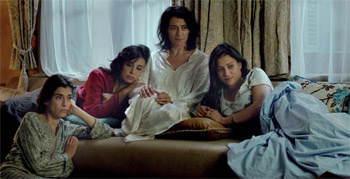Hiam Abbass Rock The Casbah Interview

Hiam Abbass Rock The Casbah Interview
Cast: Nardine Labaki, Morjana Alaoui, Lubna Azabai, Hiam Abbass, Omar Sharif
Director: Laila Marrakchi
Rated: M
Running Time: 98 Minutes
Synopsis: Summer in Tangiers, Morocco. A family reunite for three days in their home following the death of their patriarch, the influential businessman Moulay Hassan (film legend Omar Sharif), to share their memories and to grieve for his loss according to Muslim tradition. They have left the beach behind and swapped swimsuits for djellabas as everyone gathers in a show of mourning.
However, sparks start to fly when prodigal daughter Sofia jets in from New York after several years away. The youngest, she has made a new life for herself as an actress in America, but frustratingly, only ever gets television roles as a terrorist. Her return provides the opportunity to settle some scores with her sisters, as the order once maintained by Moulay breaks down.
Between laughter and tears, a collective hysteria leads each of the women to confront some home truths that have boiled beneath the surface for years.
Rock The Casbah
Release Date: November 20th, 2014
Interview with Hiam Abbass
Question: Tell us about your first meeting with Laïla Marrakchi.
Hiam Abbass: Laïla hadn't yet assembled the family for the film and she had me in mind for two roles – that of the mother and the elder sister. I was initially hesitant about committing: I'd already played this kind of role. But the more our discussions continued, the more my doubts faded. I felt carried along in this universe which reminded me of Greek tragedies, which is a dimension you don't often find in cinema.
Question: Have you seen MAROCK?
Hiam Abbass: Yes. It reminded me of the films of certain filmmakers who, well before the Arab spring, were already sketching out a revolution on its way. In MAROCK, there's a youthfulness, a playfulness, and incredible audacity. And it contained the seed, the premise of change.
Question: What made you finally accept the role of the mother?
Hiam Abbass: Laïla was finalizing her cast, we carried on talking, and I had a better understanding of why she was asking me to play this woman. In the course of our exchanges, I saw the possibility of exploring some areas that I hadn't yet tackled – I'd never played a woman belonging to the bourgeoisie, and I found her complicity and the distance she sometimes had with her daughters interesting. And the love she has for her husband – a love she shares with the maid – was a new dimension for me, light years away from the woman that I am. I was drawn to this mix of emotions.
Question: One senses that you are exacting in your film choices.
Hiam Abbass: Playing a role for the sake of it doesn't interest me. A project has to speak to me and I have to feel an attachment towards it. The encounter with the director counts a great deal in my choices. In this regard, I really appreciated the calm and clear manner with which Laïla answered all my questions.
Question: What kind of questions did you ask?
Hiam Abbass: I'm not really the same age as this woman. What could I bring to her? I wondered about her appearance: what sort of hairstyle did she have? At what times did she wear a veil? How would she reveal her secret?
Question: Does the physical aspect of a character count a lot for you?
Question: The mother maintains a very particular relationship with her daughters.
Hiam Abbass: She brought them into the world, she loves them, but she's also jealous. She lives with the awful guilt of pushing one of them to suicide. By sending her to London for an abortion, she and her husband saved their social status, but paid a terrible price. Earlier I mentioned Greek tragedy; this is squarely in that register. As in 'Phèdre", who I am currently playing on stage, the young woman is judged, rejected and abandoned, and like Phèdre, she killed herself. During these three days of mourning, the mother and the three daughters she has left settle their scores with life, each in their own way.
Question: The daughters all have something in common with the mother.
Hiam Abbass: True, they each contain something of her. Kenza, played by Lubna Azabal, has an idealized love for her father. You can tell that her marriage to her cousin was arranged and that she is torn between the love she has for her father and that which she owes to her husband, who she no doubt forces herself to love because her father chose him. She's a bit lost and can't find her path in life.
Miriam, who's played by Nadine Labaki, shares the same dissatisfaction in love, but deals with it differently by trying to change through her external appearance. She doesn't manage this, of course. Sofia, played by Morjana Alaoui, is the only one who had the guts to leave and to find herself, suppressing her culture and upbringing.
Question: Despite their difficulties, it's fascinating to see the freedom with which they open up in the course of the funeral.
Hiam Abbass: It's very representative of Arab societies. We have a proverb which says that even in the worst of disasters, you can always find something helpful. Amidst their grief, these women manage to laugh, they keep their sense of humor and a levity which helps them get through it.
Question: The cast of ROCK THE CASBAH is extraordinarily cosmopolitan, taking it far beyond the film's Moroccan context.
Hiam Abbass: Laïla dared to do what many directors wouldn't: she picked her actors according to what they could provide, without worrying about their identity. She believes – and I share this view – that an actor has no nationality. In making this choice, she gives a unique identity to the Arab woman, giving her a more global image.
Question: How did you work with Laïla Marrakchi?
Hiam Abbass: I did readings for several days with Laïla and the other actresses. It was a way of fully embracing the trajectory of each character. Everyone brought their own voice. The producer, Stéphanie Carreras, was with us and her involvement was very precious. We all had questions. Some of them were resolved during these discussions; others, like the scene with the revelation of the secret concerning Zakaria's birth, remained in suspense and didn't find an answer until we were on set. Laïla didn't have one herself. A few days after the start of the shoot, once we'd found our marks, the question of the revelation came up again: how would we reveal the secret that links the mother and the maid? We met for four hours at the hotel: it became obvious that it had to be the mother and no one else who delivered this confession. Then we went to the location where the scene would be filmed and we rehearsed it. From that point on, Laïla could picture how she would cut her film. She knows exactly what she wants, but that doesn't exclude consultation. That was very precious.
Rock The Casbah
Release Date: November 20th, 2014
MORE





